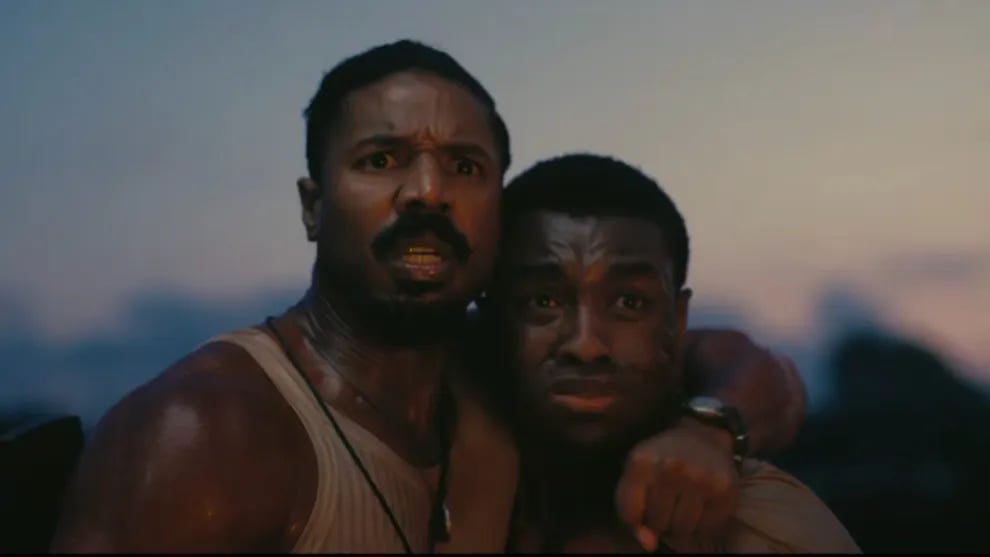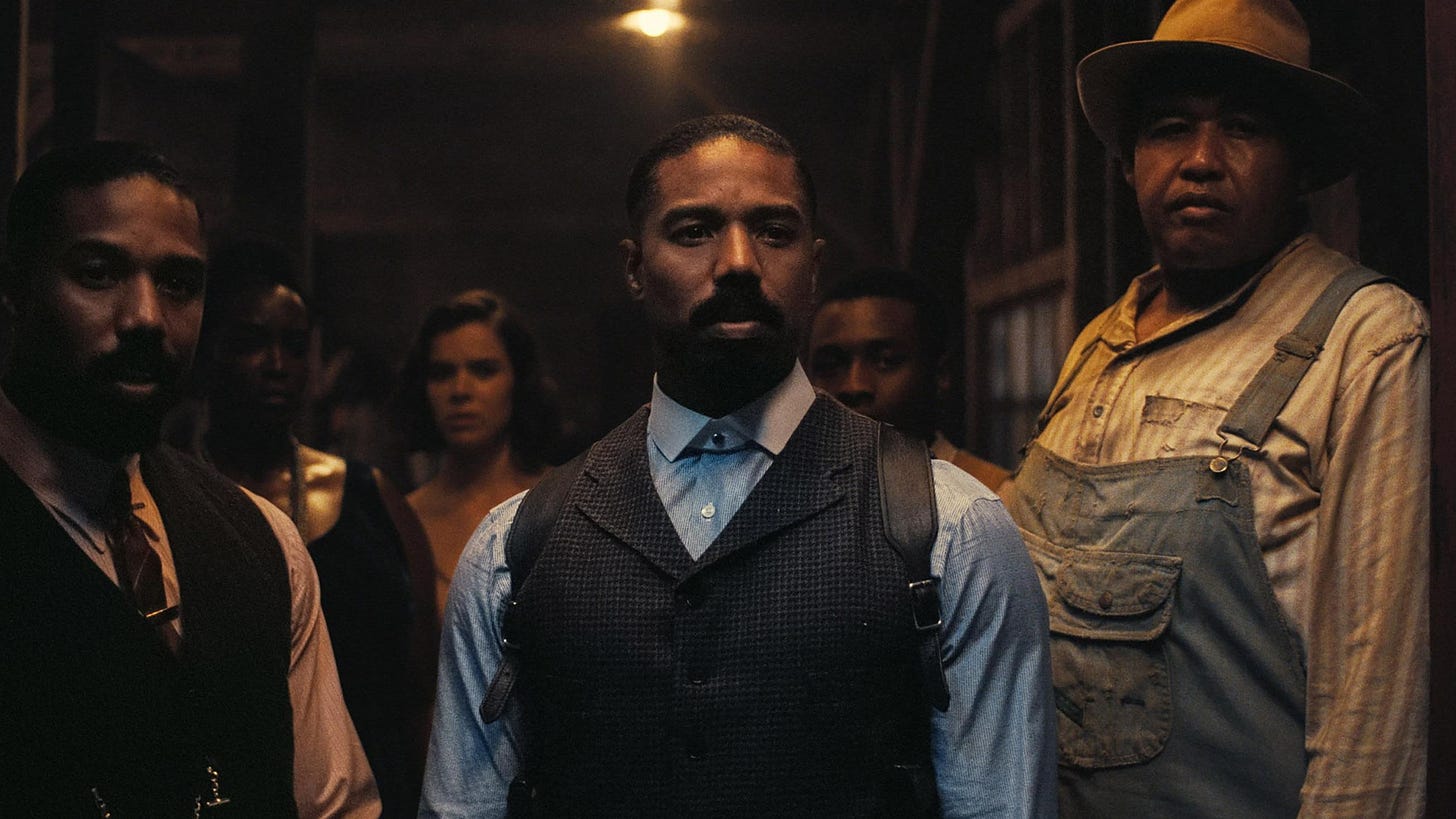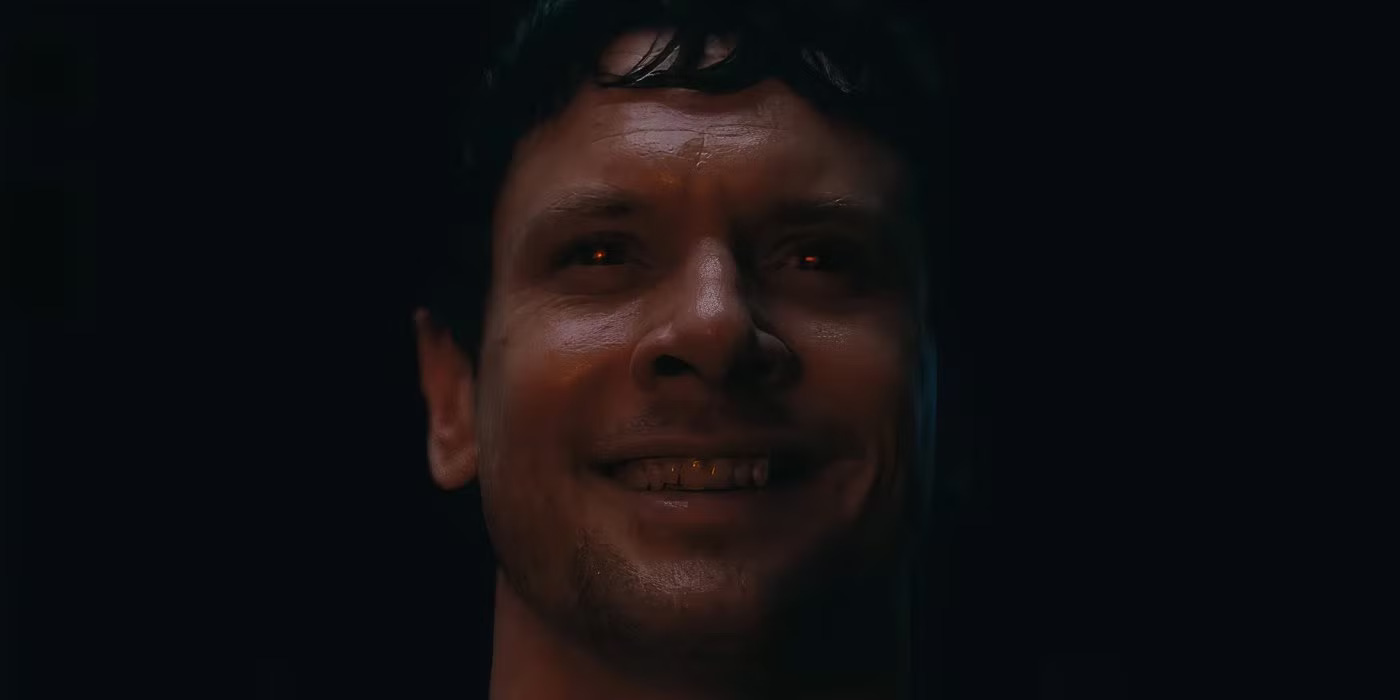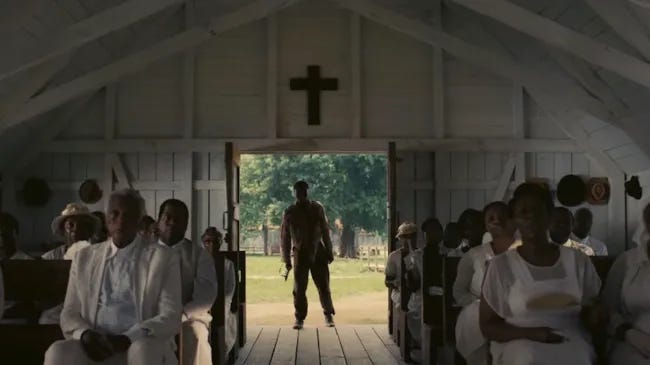Sinners is the Movie of the Year - film review
Reviewing Ryan Coogler’s Sinners (spoiler warning)
Entering this year, there weren’t many films that I was looking forward to. All posts surrounding the matter mentioned the same releases - films including Del Toro’s Frankenstein, Joon Ho’s Mickey 17, or Chu’s Wicked: For Good - But from the moment I watched the first trailer for Coogler’s Sinners in September of 2024, I was hooked on it. Every time I went to the theatre I would look forward to seeing this seemingly obscure movie involving blues music and twins played by Michael B. Jordan. In the weeks leading up to the release, me and a small group around me seemed to be the only ones aware of just how big this film was going to make it. Looking back, we could not have predicted just how right we were, and even so, our expectations for the film were exceeded and then some. Ryan Coogler’s Sinners is not simply a movie that deserves to be seen in cinemas, recognized by the academy, and given its due accolades, but it is the movie of 2025.
I’ve spoken here before about how I appreciate the occasion a movie provides, but when it comes to Coogler movies, it’s a different kind of occasion. Ryan has consistently directed stories by black people, about black people, to be related to by black people. Since the day I first stepped foot in a movie theatre, my best theatre-going experiences have been from movies directed by Coogler. There is a sort of collective fellowship feeling when the movie theatre has a line out onto the street with people queued to see films like Black Panther, Creed, and Sinners. As I was watching this film in that exact crowd, I realized just how great of a gift Ryan has to touch a black audience. There are scenes in this film that specifically appreciate black culture, whether it’s before, during, or after the movie takes place. The scene where Sammie, played by the new actor Miles Caton, becomes surrounded by black music from the past and far ahead of his time was what I needed from this film to confirm to me what I already knew. It revived that feeling in me that I felt when I watched the Black Panther movies, he found a way to see and appreciate all black culture. This screenplay spoke to me so much, specifically as a black southerner. Seeing a mother braiding her daughters hair how my mother did me and watching Sammie escape his father by hanging out with his cousins was such a surreal experience; watching my own life being portrayed in such a delicate, nostalgic, and accurate way, in a way that has seldom been done before. If Ryan Coogler was given credit for nothing else, his talent and keen eye for putting his experiences as an African American man onto the screen and having it resonate so deeply to his audience would be more than enough to win him claps all the way to the Academy stage.
I’m ashamed to admit just how unfamiliar with these actors I was. Sure, I’ve seen films starring Michael B. Jordan and a few starring Hailee Steinfeld, but it now seems like a crime to have gone my entire life ignorant to the fact that actors like Wunmi Mosako and Delroy Lindo were putting on performances like this. It’s unbelievable how magnificent each and every actor was in this film, there wasn’t a moment where I felt disengaged or that I saw an actor and not a character, which for names this recognizable, is a huge achievement. Jordan’s two performances were wildly consistent throughout and even without any tells, I was sure who I was watching on screen, whether that be Smoke or Stack. The added obstacle of having one actor play two roles on top of the already intricate and difficult storyline only adds fuel to the fire that is this film's greatness. Even outside of the main cast, Jack O’Connell, Lola Kirk, and Peter Dreimanis delivered such an eerie and culty performance that aligned perfectly with their affiliation with the klan and later, their undead nature. These actors are what made the film perfect, everyone gave their all, left their hearts on the screen with all humility, allowing a spirit of rawness to flow through them and touch the souls of everyone watching. How Coogler continues to get lucky with such star casts, I’m unsure, but whatever he is doing, he needs to keep doing it.
It was made apparent from the very first trailer that music was a central stitch in the fabric of this film. In the score, the music was not only curated to the scene to add the ambience, but the soundtrack used music from different cultures to adhere to different characters and storylines. My favorite example of this is the use of blues music in the Juke versus the Irish music (and dancing) used by Remmick, Joan, and Bert. The singing and instruments played in the Juke Joint were so electrifying, making the audience in my theatre exclaim and stir in their seats - if I wasn’t so inclined to do so myself, I would’ve called it creepy. The music was so intentional and repetitive in the way that if you hear anything like it in the future, you’ll immediately remember where you were and what you were doing when you heard it last, and the answer will forever be in the theatre watching Sinners. A smaller detail in the sound design that I missed during my first watch was during the scene where Delta Slim, played by Delroy Lindo, tells a story of his former partner in crime. As he recounts how his friend was lynched in a train station, faintly behind his story you’re able to hear the events happening - The rope tightening and the man dying - It was such a minor feature, but paying attention to small creative decisions like that is exactly what makes a magnificent filmmaker.
Before the overview of the film was released, I was convinced that the white characters were meant to be demons, representative of the terror they caused in this time. And although I wasn’t completely wrong, making them vampires was a much more interesting choice. My generation has seen so many iterations of vampires, and with Nosferatu coming out only four months ago, this film had a duty to make their vampires unique and stand out enough so that they’d not only be taken seriously, but be discussed in their own category. I enjoyed the classic traits of vampires like their aversion to sunlight or their need for an invite in order to enter an establishment. But the details of making them have a hive mind and consequently a communal sense of pain was such a smart and creative edition that worked well for the plot and what happens to them, although I think their shared thoughts could have been utilized even more. The death of Remmick was one of the most metal and epic movie vampire deaths ever made, and to see such a thing on an Imax screen in an Imax theatre is an experience that only those who saw it that way will understand. One of my favorite scenes of the vampires is when they finished the Lord’s Prayer for Sammie. There was an underlying message in this scene, as there was for every other scene in the film. These vampires, literal devils, were saying the same words that believers said. It was so sinister, but Coogler was obviously trying to say something: Anyone can say the words, anyone can state the fact that they’re believers; but in the end, we are all sinners. And every moment after that, I think Sammie was reminded of that moment and determined to use his music to differentiate himself from wolves in sheeps clothing - those who can say the same prayers as he does, walk the way he does, but have demons inside of them. To utilize the vampires in that scene was so chillingly genius and made it hard, once again, to believe that such a perfect display of southern religious horror could be made by such a young filmmaker.
The writing in this movie was unbelievably solid and paired with the right actors to bring it to life, it shot this film up in the ranks. Hearing jokes in a film when it’s going well has begun to make me cringe these days. I get so nervous that forced comedic relief will ruin the film for me and cause more stifled fake laughs rather than genuine amusement, which has become more and more rare in cinemas as of recent. But in Sinners, each time I saw it, every joke landed. Slim had such stellar comedic timing and made audiences laugh even when he was simply being his character in scenes that I don’t think were written to get laughs. Smoke and Stack were written so differently but yet so alike. They were written exactly how twins should be written - like people who have spent their whole lives together without falling into the trap of making them clones who finish each other’s sentences and have only a physical marking to differentiate them. They were written and acted like real siblings do, their dynamic and ultimately their end (or lack thereof) was so beautiful and thought out. The lack of an ending for Smoke makes the film that much more mysterious all while saying so much…but so little.
Sinners is one of the few movies that I have absolutely no notes for. Ryan Coogler has too long been overlooked and undermined, but with the success and positive reviews this film is receiving, I hope that this is what it took for his recognition to globalize itself. Sinners has everything that the majority of films in recent years have been lacking. This is the film to bring homebodies into cinemas to enjoy it on the big screen - To make them laugh, cry, gasp, and cover their eyes in the company of their fellow audience members. Coogler, his cast, and his crew created something truly valuable and special in the world of cinema and I can only hope that this will be the step needed to end the gross under appreciation of the horror and thriller genre in mainstream media. Ryan Coogler has made a perfect movie that has millions congregating in theatres, and it’s not a drama. I’m confident in saying that although Coogler coming out with the greatest movie of the year wasn’t on my 2025 bingo card, I am beyond excited to see what he and his creative team come up with next, and I will be front and center in the Imax theatre to watch it.








Vampirism as a metaphor for white supremacy works so very well. There is so much to say about this movie one could write a thesis about it. I thought it was perfect.
The film "Sinners" paints an incredibly deep and painful metaphor for modern America. Vampires are not merely creatures of folklore here — they represent systems that drain, exploit, and destroy the living energy of society under the guise of salvation or civilization.
American history is full of paradoxes: those who proclaimed themselves "liberators" often became oppressors. Colonialism, slavery, segregation, the violent "enlightenment" of Indigenous peoples, cultural assimilation — all followed the same principle: "We know better. We will save you. Even if it means destroying you."
The vampirism in "Sinners" captures this trauma: the desire to dominate, to parasitize others, while convincing oneself of moral righteousness. The white vampires praying alongside the heroes symbolize the American hypocrisy that, generation after generation, cloaks itself in religious, patriotic, or moral rhetoric.
The film strongly hints: in a society where "salvation" can be a form of enslavement, where the right words don't guarantee purity of heart, anyone can become a sinner. True redemption lies not in declarations but in deep, inner honesty.
The America of "Sinners" is a country that has not yet fully confronted its own shadow. A country where the real battle is not external, but internal: between words and actions, between performative sanctity and true humanity.